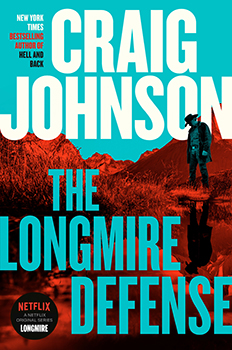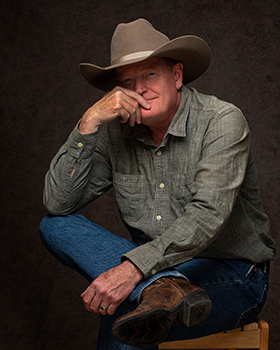

Features Craig Johnson
Wyoming and Westerns – Forever Dance Partners
The Big Thrill Interviews Craig Johnson
 Best-selling author Craig Johnson returns to a fan-favorite series with THE LONGMIRE DEFENCE. In the late 1940s, it appears Bill Sutherland has been murdered, but the investigation is stymied because no member of the elk camp was carrying the caliber rifle that might have killed the Wyoming state accountant. When the weapon is later discovered in the Bighorn Mountains, it catapults the Sheriff of Absaroka County on an investigation with ties to a hidden mineral fund that may be worth billions. The embodiment of a fair-minded detective, Walt is pushed to his ethical boundaries when he discovers the rifle in question belonged to his grandfather, Lloyd Longmire.
Best-selling author Craig Johnson returns to a fan-favorite series with THE LONGMIRE DEFENCE. In the late 1940s, it appears Bill Sutherland has been murdered, but the investigation is stymied because no member of the elk camp was carrying the caliber rifle that might have killed the Wyoming state accountant. When the weapon is later discovered in the Bighorn Mountains, it catapults the Sheriff of Absaroka County on an investigation with ties to a hidden mineral fund that may be worth billions. The embodiment of a fair-minded detective, Walt is pushed to his ethical boundaries when he discovers the rifle in question belonged to his grandfather, Lloyd Longmire.
Johnson took some time to chat about his new book with The Big Thrill.
When working on a new story, which takes shape first: plot, character, or setting?
All of the above. First, I have to create a plot that’s feasible, one that could happen in the Rocky Mountain West. Next would be determining what the effects of the plot are on the characters, and how it’s going to advance them. Finally, there’s the setting. The Longmire novels take place in the least populated county in the most sparsely populated state in the country, so it’s going to be a challenge to make each one different.
Early on, I decided to write in what I call The Vivaldi or Four Seasons—each novel taking place in one of the four seasons, requiring four books to make up one year of Walt’s literary life, or as my wife likes to call it, Walt-Years (i.e., dog-years). January is nothing like July on the high plains.
Considering the Walt/Lloyd dynamic that feeds this tale, do you think Walt is looking for resolution, absolution, or redemption?
Walt’s relationship with his grandfather has always been a rocky one, and I think when the novel starts, he really wants Lloyd to have committed the murder, but through the investigation he garners a begrudging respect for the man and perhaps even a bit of admiration and fondness.
Walt and Vic’s relationship goes through a big change. Why, and why now?
When I first started writing the books, I got a lot of advice from other writers, such as you can have sexual tension between characters in the novels but you can’t consummate anything for sixteen or seventeen novels—and all I could think was, ‘What kind of women are you dating that would wait sixteen or seventeen years for something to finally happen?’ So, I started it off in the third book and never looked back, finally making a big step in THE LONGMIRE DEFENSE. I think the lifeblood of any series is going to be the evolution of its characters, how they change and adapt to the challenges you subject them to during the series—it was just the next logical step. (Any more than that is a spoiler I don’t want to give away).
Every year or so, somebody comes out and proclaims that the western is truly and immitigably dead—they’re always wrong.
Some key scenes feature two things happening at the same time. Is this intentional?
Thanks for noticing—it’s generally intentional and happens right off the bat. There’s usually something happening when someone is telling you a story, for instance, and the trick is finding something that will tie-into that story. You’re aware of what’s going on while that tale is being told, but a consummate storyteller (and I’ve known a few) can almost transport you into that story so that you’re there while being in some other place or time when you hear it. The other trick is not letting one story override the other or distract from it; somehow, there has to be a symbiotic connection and balance between the two, almost like compatible dance partners.
Why do you think the Western as a genre has endured for so long?
It’s a blank slate, a cultural, topographical entity that allows any and all. Every year or so, somebody comes out and proclaims that the western is truly and immitigably dead—they’re always wrong. You can’t kill anything that’s so open to interpretation—it will always find a way to survive.
After 19 novels, has your writing method changed over the years, and if so, how?
I’ve become more confident in my writing, and I think that allows me to concentrate on more important things, like the craft rather than the insecurity.
The Big Thrill Interviews Craig Johnson
- Mark Greaney by José H. Bográn (VIDEO) - June 27, 2024
- Brian Andrews & Jeffrey Wilson by José H. Bográn (Video) - May 23, 2024
- Classic Thrills: THE DAY OF THE JACKAL by Frederick Forsyth - May 10, 2024

